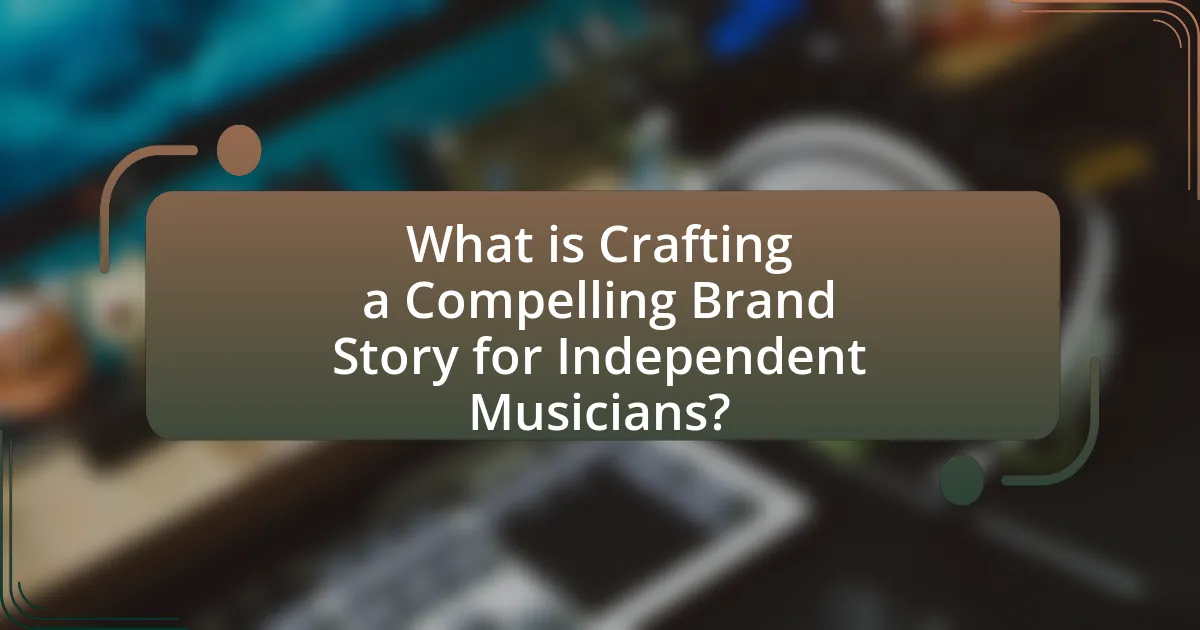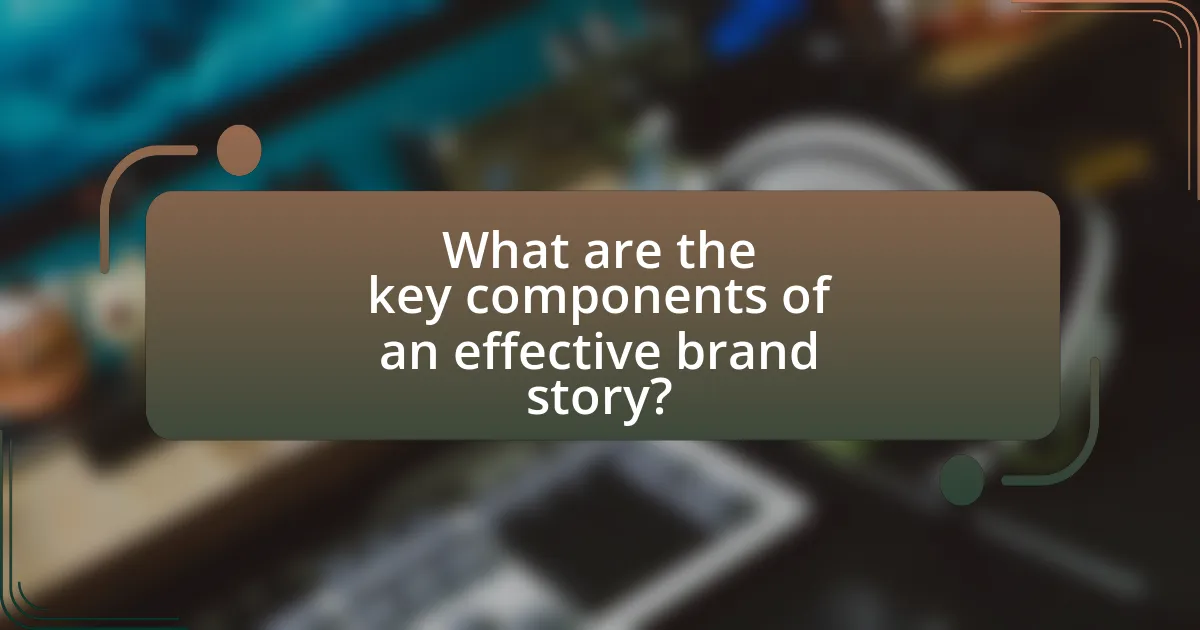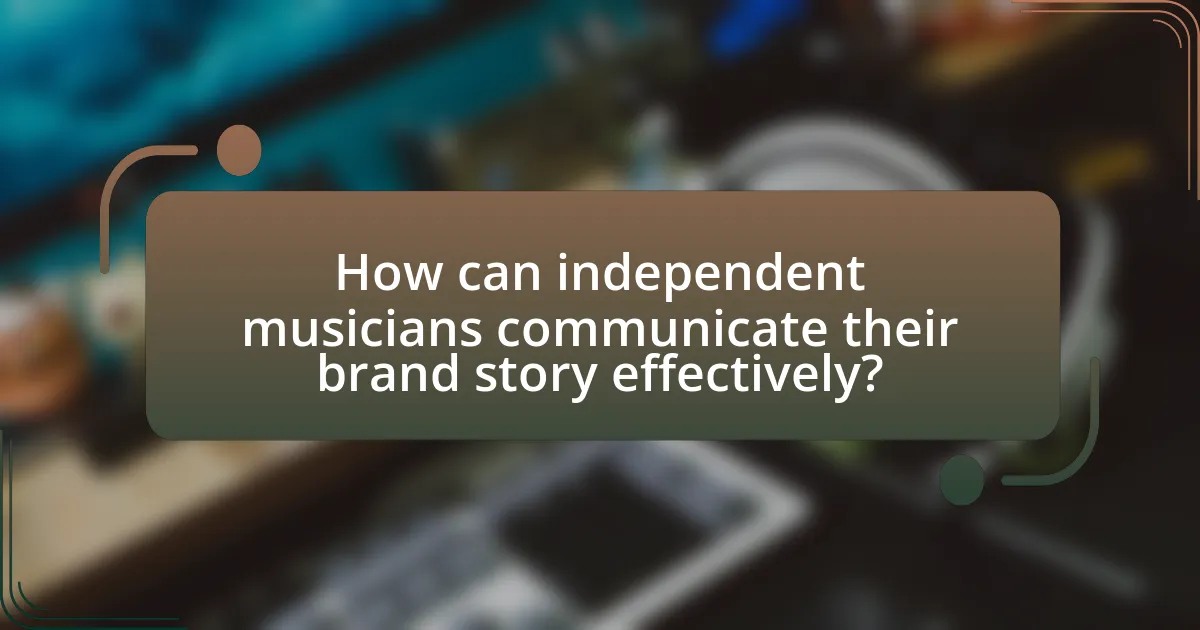Crafting a compelling brand story is essential for independent musicians as it establishes their unique identity and fosters emotional connections with audiences. This article explores the significance of storytelling in enhancing brand perception, with research indicating that compelling narratives can increase audience retention and loyalty. Key components of an effective brand story include authenticity, emotional connection, relatability, and a clear narrative arc. The article also discusses strategies for musicians to identify their unique narratives, engage their audience through various platforms, and avoid common pitfalls in storytelling, ultimately emphasizing the importance of a well-crafted brand story in a competitive music industry.

What is Crafting a Compelling Brand Story for Independent Musicians?
Crafting a compelling brand story for independent musicians involves creating a narrative that authentically represents their identity, values, and artistic journey. This narrative serves to connect with audiences on an emotional level, fostering loyalty and engagement. Research indicates that storytelling can significantly enhance brand perception; for instance, a study by the Harvard Business Review found that stories can increase audience retention by up to 22 times compared to facts alone. By integrating personal experiences, challenges, and aspirations into their brand story, independent musicians can differentiate themselves in a crowded market and build a strong, relatable presence.
Why is a brand story important for independent musicians?
A brand story is important for independent musicians because it establishes a unique identity that resonates with audiences. This narrative helps musicians differentiate themselves in a saturated market, fostering emotional connections with fans. According to a study by the Harvard Business Review, brands with compelling stories can increase customer loyalty by up to 30%. By sharing their journey, values, and experiences, independent musicians can create a relatable persona that attracts and retains listeners, ultimately enhancing their career sustainability.
What elements make up a compelling brand story?
A compelling brand story consists of authenticity, emotional connection, relatability, and a clear narrative arc. Authenticity ensures that the brand’s message resonates with the audience, as consumers increasingly prefer genuine stories over fabricated ones. Emotional connection engages the audience on a personal level, making them more likely to remember and share the story. Relatability allows the audience to see themselves in the story, fostering a sense of belonging and loyalty. A clear narrative arc provides structure, guiding the audience through the brand’s journey, challenges, and triumphs, which can enhance engagement and retention. These elements collectively create a memorable and impactful brand story that resonates with audiences, as evidenced by successful brands like Apple and Nike, which utilize these components effectively in their storytelling.
How does a brand story differentiate musicians in a crowded market?
A brand story differentiates musicians in a crowded market by creating a unique narrative that resonates with audiences, establishing emotional connections. This narrative can highlight personal experiences, values, and artistic vision, making the musician more relatable and memorable. For instance, musicians like Taylor Swift have effectively used their brand stories to connect with fans through themes of personal growth and resilience, which has contributed to their sustained popularity and loyalty among listeners. By leveraging a compelling brand story, musicians can stand out in a saturated industry, as it provides a distinct identity that sets them apart from others who may offer similar musical styles.
How can independent musicians identify their unique narrative?
Independent musicians can identify their unique narrative by reflecting on their personal experiences, influences, and artistic vision. This process involves introspection to uncover what sets them apart from others in the music industry. For instance, musicians can analyze their life stories, cultural backgrounds, and the emotions that drive their music, which helps in crafting a narrative that resonates with their audience. Research indicates that storytelling in branding can enhance emotional connections with listeners, making it essential for musicians to articulate their narratives clearly and authentically. By doing so, they can create a compelling brand story that not only defines their identity but also engages their fan base effectively.
What personal experiences can musicians draw from for their story?
Musicians can draw from a variety of personal experiences for their story, including their upbringing, relationships, struggles, and pivotal life events. These experiences shape their identity and influence their music, allowing them to connect with audiences on a deeper level. For instance, many musicians reflect on childhood experiences, such as family dynamics or cultural background, which often inform their lyrical themes and artistic direction. Additionally, personal challenges, such as overcoming adversity or dealing with loss, can serve as powerful narratives that resonate with listeners. This connection is supported by research indicating that authenticity in storytelling enhances audience engagement, as seen in studies on emotional resonance in music.
How do values and beliefs shape a musician’s brand story?
Values and beliefs fundamentally shape a musician’s brand story by defining their identity and guiding their artistic choices. These core principles influence the themes in their music, the messages they convey, and the way they engage with their audience. For instance, a musician who values social justice may create songs that address inequality, thereby attracting listeners who share similar beliefs. This alignment fosters a deeper connection with fans, as seen with artists like Billie Eilish, whose advocacy for mental health resonates with her audience. Consequently, a musician’s values and beliefs not only inform their creative output but also establish a narrative that differentiates them in a competitive industry, ultimately enhancing their brand authenticity and loyalty among fans.

What are the key components of an effective brand story?
The key components of an effective brand story include authenticity, emotional connection, relatability, and a clear message. Authenticity ensures that the brand story reflects the true values and mission of the musician, which builds trust with the audience. Emotional connection engages listeners on a deeper level, making them feel invested in the musician’s journey. Relatability allows the audience to see themselves in the story, fostering a sense of community and shared experience. A clear message communicates the core essence of the brand, making it memorable and impactful. These components are essential for independent musicians to resonate with their audience and establish a strong brand identity.
How can musicians create an emotional connection with their audience?
Musicians can create an emotional connection with their audience by sharing personal stories and experiences through their music. This approach allows listeners to relate to the emotions conveyed in the lyrics and melodies, fostering a sense of intimacy and understanding. For instance, artists like Taylor Swift often draw from their own life events, which resonates deeply with fans, as evidenced by her album “Folklore,” where she explores themes of nostalgia and personal growth. Research indicates that emotional storytelling in music enhances listener engagement, making the experience more memorable and impactful.
What role does authenticity play in storytelling?
Authenticity is crucial in storytelling as it fosters trust and emotional connection between the storyteller and the audience. When independent musicians share genuine experiences and emotions, they create relatable narratives that resonate deeply with listeners. Research indicates that 86% of consumers value authenticity in brands, suggesting that authentic storytelling can significantly enhance audience engagement and loyalty. By presenting true stories, musicians can differentiate themselves in a crowded market, making their brand more memorable and impactful.
How can musicians use vulnerability to enhance their narrative?
Musicians can use vulnerability to enhance their narrative by sharing personal experiences and emotions that resonate with their audience. This approach fosters a deeper connection, as listeners often relate to themes of struggle, loss, or triumph. For instance, artists like Adele and Taylor Swift have successfully integrated their personal stories into their music, which has led to widespread acclaim and a loyal fan base. Research indicates that vulnerability in storytelling can increase empathy and engagement, making the narrative more impactful. By being open about their challenges and feelings, musicians create authenticity, which is crucial for building a compelling brand story.
What storytelling techniques can enhance a musician’s brand story?
To enhance a musician’s brand story, techniques such as personal narrative, emotional connection, and visual storytelling are effective. Personal narrative allows musicians to share their unique journey, fostering authenticity and relatability. Emotional connection engages the audience by evoking feelings that resonate with their experiences, making the musician’s story memorable. Visual storytelling, through imagery and video, complements the narrative by providing a vivid representation of the musician’s identity and message, which can significantly increase audience engagement. These techniques are supported by studies indicating that stories with emotional resonance are more likely to be shared and remembered, thus amplifying a musician’s brand presence.
How can imagery and metaphors be used effectively?
Imagery and metaphors can be used effectively by creating vivid mental pictures and drawing comparisons that resonate with the audience’s emotions. This technique enhances storytelling by making abstract concepts tangible, allowing listeners to connect with the musician’s experiences and emotions on a deeper level. For instance, using metaphors like “the stage is a battlefield” can evoke feelings of struggle and triumph, making the musician’s journey relatable. Research indicates that effective imagery and metaphors can increase audience engagement and retention, as they stimulate the imagination and foster emotional connections, which are crucial for independent musicians aiming to establish a compelling brand story.
What is the importance of a narrative arc in a brand story?
A narrative arc is crucial in a brand story because it provides structure and emotional engagement, guiding the audience through a compelling journey. This structure typically includes a beginning that introduces the brand, a middle that presents challenges or conflicts, and an end that resolves these issues, creating a satisfying conclusion. Research indicates that stories with a clear narrative arc are 22 times more memorable than facts alone, highlighting the effectiveness of storytelling in brand communication. By employing a narrative arc, independent musicians can connect with their audience on a deeper level, fostering loyalty and enhancing brand recognition.

How can independent musicians communicate their brand story effectively?
Independent musicians can communicate their brand story effectively by utilizing social media platforms to share authentic narratives and engage with their audience. By consistently posting behind-the-scenes content, personal anecdotes, and insights into their creative process, musicians can create a relatable and compelling brand identity. Research indicates that 70% of consumers feel more connected to brands with authentic storytelling, highlighting the importance of genuine communication in building a loyal fan base. Additionally, musicians can leverage platforms like Instagram and TikTok to visually represent their journey, further enhancing audience connection and engagement.
What platforms are best for sharing a musician’s brand story?
The best platforms for sharing a musician’s brand story are Instagram, Facebook, YouTube, and TikTok. Instagram allows musicians to visually showcase their journey and connect with fans through stories and posts, while Facebook provides a broader audience reach and community engagement through groups and events. YouTube serves as a powerful medium for storytelling through music videos and vlogs, enabling deeper connections with listeners. TikTok, with its short-form video format, allows musicians to creatively share snippets of their story and engage with a younger audience. These platforms collectively enhance visibility and foster a personal connection with fans, which is essential for building a musician’s brand.
How can social media be leveraged for storytelling?
Social media can be leveraged for storytelling by utilizing platforms to share authentic narratives that resonate with audiences. Independent musicians can create engaging content through posts, videos, and live streams that highlight their personal journeys, creative processes, and behind-the-scenes moments. For instance, Instagram Stories and TikTok allow musicians to showcase snippets of their lives and music, fostering a deeper connection with fans. According to a study by the Pew Research Center, 69% of adults in the U.S. use social media, indicating a vast audience for storytelling. This engagement can lead to increased fan loyalty and support, as audiences feel more connected to the artist’s story.
What role does live performance play in conveying a brand story?
Live performance serves as a dynamic medium for conveying a brand story by creating an immersive experience that engages audiences emotionally. This engagement fosters a deeper connection between the musician and the audience, allowing the brand narrative to resonate more profoundly. For instance, studies show that live events can enhance brand recall by up to 70%, as the combination of music, visuals, and atmosphere creates memorable moments that reinforce the brand’s identity. Additionally, live performances enable musicians to showcase their authenticity and personality, which are crucial elements in building a relatable brand story.
How can musicians engage their audience through their brand story?
Musicians can engage their audience through their brand story by sharing authentic narratives that resonate emotionally with listeners. This engagement occurs when musicians articulate their personal journeys, struggles, and inspirations, creating a relatable connection. For instance, artists like Taylor Swift have effectively used storytelling in their lyrics and social media to foster a sense of intimacy and community among fans. Research indicates that emotional storytelling can increase audience retention and loyalty, as it allows fans to feel personally invested in the artist’s journey. By consistently integrating their brand story into their music, performances, and marketing, musicians can cultivate a dedicated fan base that feels connected to their artistic identity.
What strategies can be used to invite audience participation?
To invite audience participation, independent musicians can employ strategies such as interactive social media campaigns, live Q&A sessions, and audience-driven content creation. Interactive social media campaigns encourage fans to share their experiences or opinions, fostering a sense of community and engagement. Live Q&A sessions allow musicians to connect directly with their audience, answering questions and discussing topics of interest, which enhances personal connection. Audience-driven content creation, such as soliciting song ideas or feedback on new material, empowers fans to contribute creatively, making them feel valued and involved in the artistic process. These strategies have been shown to increase engagement and loyalty among fans, as evidenced by successful independent artists who actively involve their audience in their creative journey.
How can feedback from fans shape a musician’s brand narrative?
Feedback from fans can significantly shape a musician’s brand narrative by providing insights into audience preferences and emotional connections. This feedback allows musicians to tailor their music, visuals, and messaging to resonate more deeply with their fan base. For instance, when fans express their favorite themes or styles, musicians can adapt their creative direction to align with these preferences, thereby enhancing engagement and loyalty. Research indicates that musicians who actively incorporate fan feedback into their work often see increased streaming numbers and social media interactions, demonstrating the tangible impact of this engagement on their brand narrative.
What are some best practices for crafting a compelling brand story?
To craft a compelling brand story, independent musicians should focus on authenticity, emotional connection, and clear messaging. Authenticity ensures that the story reflects the musician’s true self and experiences, which resonates with audiences. Emotional connection can be achieved by sharing personal anecdotes or challenges faced during their musical journey, making the story relatable. Clear messaging involves articulating the musician’s values, mission, and unique selling points in a concise manner. For instance, a study by the Harvard Business Review found that brands with authentic stories can increase customer loyalty by up to 50%, highlighting the importance of genuine narratives in building a strong brand identity.
How can musicians ensure consistency in their storytelling across platforms?
Musicians can ensure consistency in their storytelling across platforms by developing a clear brand narrative that aligns with their artistic vision and values. This narrative should be articulated in a way that is adaptable to various formats, such as social media, music videos, and live performances, while maintaining core themes and messages. For instance, if a musician emphasizes themes of resilience and empowerment in their music, these themes should also be reflected in their social media posts, interviews, and promotional materials. Consistent visual branding, including logos, color schemes, and imagery, further reinforces this narrative across different platforms. Research indicates that brands with consistent messaging can achieve up to 23% more revenue than those without, highlighting the importance of cohesive storytelling in building a recognizable and relatable artist identity.
What common pitfalls should musicians avoid when crafting their brand story?
Musicians should avoid being overly generic in their brand story, as this dilutes their unique identity. A common pitfall is failing to articulate a clear narrative that reflects personal experiences and values, which can lead to a lack of connection with the audience. Additionally, musicians often neglect to consider their target audience, resulting in a story that does not resonate with potential fans. Research indicates that brands with a well-defined story can increase customer loyalty by up to 30%, highlighting the importance of authenticity and relatability in storytelling.
